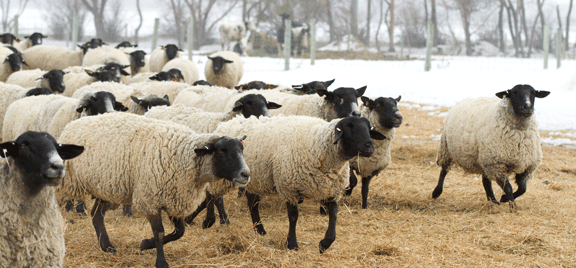U of S sheep get their day in the sun
Even though sheep have been on campus since 1911, the dairy cows still get most of the attention … that was until a class on sheep was launched this past term.
By Colleen MacPherson "The cows are more visible," said Fiona Buchanan, professor in the Department of Animal and Poultry Science, "but I always thought sheep would get attention if people drove past them everyday. So to test the waters and gauge interest we offered a sheep and goat management course."
"The cows are more visible," said Fiona Buchanan, professor in the Department of Animal and Poultry Science, "but I always thought sheep would get attention if people drove past them everyday. So to test the waters and gauge interest we offered a sheep and goat management course."
The idea was met with a bit of skepticism, continued Buchanan, who grew up on a sheep farm in New Zealand and was a natural manager for the university's sheep flock. "We were told we wouldn't get many more than four or five students. Most of the interest is in beef, because we have a lot of students from beef ranches."
But the class filled up in no time and the enrolment cap had to be raised, then raised again. It finally leveled off at 32 students from the College of Agriculture and Bioresources.
"I think students want hands-on experience. There are also more urban students in agriculture than ever before and sheep are less intimidating (than cows). They are also really fun animals."
So in the barns and classrooms, the students get the chance to learn everything about sheep, from reproduction, breeding and lambing to diseases, hoof trimming and shearing, explained Buchanan, a beef cattle geneticist by training who just happens to love sheep and wants to share her favourite animal with as many as possible.
The increased interest on campus is reflected in the province as well, she explained. "It's not big business in Saskatchewan, not compared to beef cattle, but it is growing in the number of producers and the number of breeding ewes."
The number of registered ewes in the province grew from 60,000 in 2010 to 68,000 in 2012, and she expects that growth to continue. "Right now, only about 41 per cent of all lamb consumed in Saskatchewan is from Saskatchewan but I think Saskatchewan producers will change that."
As the industry grows, so too does the need for knowledge and expertise. "The flock of sheep on campus is around 300 to ensure we have enough for all teaching and research needs, both within the department and at VIDO. Students from vet med and SIAST use the flock for learning and training too, especially during lambing which happens twice per year."
The growth rate of lambs is excellent, Buchanan said and because of that, "the course can cover everything, from lambing, weaning and shearing, in one term."
As for the class, which concludes with the shearing demonstration, Buchanan has heard a lot of positive feedback and thinks there will be continued student interest and maybe even more public interest.
"I just know people would love to see them."

